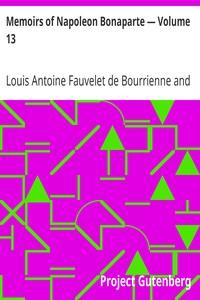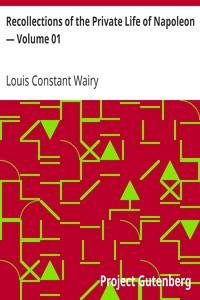Read this ebook for free! No credit card needed, absolutely nothing to pay.
Words: 20168 in 3 pages
This is an ebook sharing website. You can read the uploaded ebooks for free here. No credit cards needed, nothing to pay. If you want to own a digital copy of the ebook, or want to read offline with your favorite ebook-reader, then you can choose to buy and download the ebook.


: Memoirs of Napoleon Bonaparte — Volume 15 by Bourrienne Louis Antoine Fauvelet De Phipps Ramsay Weston Editor - Napoleon I Emperor of the French 1769-1821; Napoleon I Emperor of the French 1769-1821 Contemporaries; Napoleon I Emperor of the French 1769-1
Having resumed my uniform of a captain of the National Guard, I proceeded immediately to the King's palace. The salon was filled with ladies and gentlemen who had come to congratulate the King on his return. At St. Denis I found my family, who, not being aware that I had left Hamburg, were much surprised to see me.
They informed me that the Parisians were all impatient for the return of the King--a fact of which I could judge by the opposition manifested to the free expression of public feeling. Paris having been declared in a state of blockade, the gates were closed, and no one was permitted to leave the capital, particularly by the Barriere de la Chapelle. It is true that special permission might be obtained, and with tolerable ease, by those who wished to leave the city; but the forms to be observed for obtaining the permission deterred the mass of the people from proceeding to St. Denis, which, indeed, was the sole object of the regulation. As it had been resolved to force Fouche and the tri-coloured cockade upon the King, it was deemed necessary to keep away from his Majesty all who might persuade him to resist the proposed measures. Madame de Bourrienne told me that on her arrival at St. Denis she called upon M. Hue and M. Lefebvre, the King's physician, who both acquainted her with those fatal resolutions. Those gentlemen, however, assured her that the King would resolutely hold out against the tri-coloured cockade, but the nomination of the ill-omened man appeared inevitable.
Fouche was resolved to have his restoration as well as M. de Talleyrand, who had had his the year before; he therefore contrived to retard the King's entry into Paris for four days. The prudent members of the Chamber of Peers, who had taken no part in the King's Government in 1814, were the first to declare that it was for the interest of France to hasten his Majesty's entrance into Paris, in order to prevent foreigners from exercising a sort of right of conquest in a city which was a prey to civil dissension and party influence. Blucher informed me that the way in which Fouche contrived to delay the King's return greatly contributed to the pretensions of the foreigners who, he confessed, were very well pleased to see the population of Paris divided in opinion, and to hear the alarming cries raised by the confederates of the Faubourgs when the King was already at St. Denis.
I was not ignorant of the Duke of Wellington's influence upon the affairs of the second Restoration, but for a long time I refused to believe that his influence should have outweighed all the serious considerations opposed to such a perfect anomaly as appointing Fouche the Minister of a Bourbon. But I was deceived. France and the King owed to him Fouche's introduction into the Council, and I had to thank him for the impossibility of resuming a situation which I had relinquished for the purpose of following the King into Belgium. Could I be Prefect of Police under a Minister whom a short time before I had received orders to arrest, but who eluded my agents? That was impossible. The King could not offer me the place of Prefect under Fouche, and if he had I could not have accepted it. I was therefore right in not relying on the assurances which had been given me; but I confess that if I had been told to guess the cause why they could not be realised I never should have thought that cause would have been the appointment of Fouche as a Minister of the King of France. At first, therefore, I was of course quite forgotten, as is the custom of courts when a faithful subject refrains from taking part in the intrigues of the moment.
Fouche never regarded a benefit in any other light than as the means of injuring his benefactor. The King, deceived, like many other persons, by the reputation which Fouche's partisans had conjured up for him, was certainly not aware that Fouche had always discharged the functions of Minister in his own interest, and never for the interest of the Government which had the weakness to entrust him with a power always dangerous in his hands. Fouche had opinions, but he belonged to no party, and his political success is explained by the readiness with which he always served the party he knew must triumph, and which he himself overthrew in its turn. He maintained himself in favour from the days of blood and terror until the happy time of the second Restoration only by abandoning and sacrificing those who were attached to him; and it might be said that his ruling passion was the desire of continual change. No man was ever characterised by greater levity or inconstancy of mind. In all things he looked only to himself, and to this egotism he sacrificed both subjects and Governments. Such were the secret causes of the sway exercised by Fouche during the Convention, the Directory, the Empire, the Usurpation, and after the second return of the Bourbons. He helped to found and to destroy every one of those successive Governments. Fouche's character is perfectly unique. I know no other man who, loaded with honours, and almost escaping disgrace, has passed through so many eventful periods, and taken part in so many convulsions and revolutions.
On the 7th of July the King was told that Fouche alone could smooth the way for his entrance into Paris, that he alone could unlock the gates of the capital, and that he alone had power to control public opinion. The reception given to the King on the following day afforded an opportunity of judging of the truth of these assertions. The King's presence was the signal for a feeling of concord, which was manifested in a very decided way. I saw upon the boulevards, and often in company with each other, persons, some of whom had resumed the white cockade, while others still retained the national colours, and harmony was not in the least disturbed by these different badges.
Having returned to private life solely on account of Fouche's presence in the Ministry, I yielded to that consolation which is always left to the discontented. I watched the extravagance and inconsistency that were passing around me, and the new follies which were every day committed; and it must be confessed that a rich and varied picture presented itself to my observation. The King did not bring back M. de Blacas. His Majesty had yielded to prudent advice, and on arriving at Mons sent the unlucky Minister as his ambassador to Naples. Vengeance was talked of, and there were some persons inconsiderate enough to wish that advantage should be taken of the presence of the foreigners in order to make what they termed "an end of the Revolution," as if there were any other means of effecting that object than frankly adopting whatever good the Revolution had produced. The foreigners observed with satisfaction the disposition of these shallow persons, which they thought might be turned to their own advantage. The truth is, that on the second Restoration our pretended allies proved themselves our enemies.
But for them, but for their bad conduct, their insatiable exactions, but for the humiliation that was felt at seeing foreign cannon planted in the streets of Paris, and beneath the very windows of the Palace, the days which followed the 8th of July might have been considered by the Royal Family as the season of a festival. Every day people thronged to the garden of the Tuileries, and expressed their joy by singing and dancing under the King's windows.
This ebullition of feeling might perhaps be thought absurd, but it at least bore evidence of the pleasure caused by the return of the Bourbons.
While the King was at St. Denis he restored to General Dessoles the command of the National Guard. The General ordered the barriers to be immediately thrown open. On the day of his arrival in Paris the King determined, as a principle, that the throne should be surrounded by a Privy Council, the members of which were to be the princes and persons whom his Majesty might appoint at a future period. The King then named his new Ministry, which was thus composed:
Prince Talleyrand, peer of France, President of the Council of Ministers, and Secretary of State for Foreign Affairs.
Baron Louis, Minister of Finance.
Free books android app tbrJar TBR JAR Read Free books online gutenberg
More posts by @FreeBooks

: Memoirs of Napoleon Bonaparte — Volume 14 by Bourrienne Louis Antoine Fauvelet De Phipps Ramsay Weston Editor - Napoleon I Emperor of the French 1769-1821; Napoleon I Emperor of the French 1769-1821 Contemporaries; Napoleon I Emperor of the French 1769-1


: Memoirs of Napoleon Bonaparte — Volume 13 by Bourrienne Louis Antoine Fauvelet De Phipps Ramsay Weston Editor - Napoleon I Emperor of the French 1769-1821; Napoleon I Emperor of the French 1769-1821 Contemporaries; Napoleon I Emperor of the French 1769-1


: Memoirs of Napoleon Bonaparte — Complete by Bourrienne Louis Antoine Fauvelet De Phipps Ramsay Weston Editor - Napoleon I Emperor of the French 1769-1821; Napoleon I Emperor of the French 1769-1821 Contemporaries; Napoleon I Emperor of the French 1769-18




